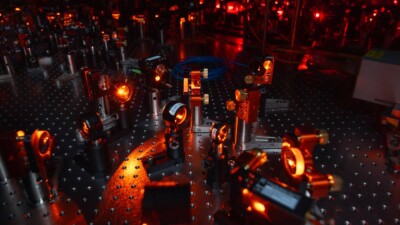A new study finds that 96% of HPC centers plan to adopt quantum computing within the next five years.
In describing the importance of quantum computing, IBM provides the classic example of seating a group of people at a dinner party. With only one optimal seating plan, the number of possible combinations increases depending on the number of people who are going to sit around a table. With two guests, there are two total combinations. With five people, there are 120 combinations. But remarkably, there are more than 3 million possible seating arrangements with 10 people.

These types of complex problems are difficult to solve with traditional supercomputers that rely on thousands of CPU and GPU cores. Without the working memory to hold all the possible combinations simultaneously, conventional supercomputers need to analyze each combination in sequence. This can quickly become a time-consuming and expensive process depending on the type of problem a company is trying to solve.
With a theoretical example of a dinner party, the consequences of these computational limits may seem insignificant. But with real-world scenarios, the need for quantum computing quickly becomes apparent. For example, a company may want to determine the optimal route to deliver products to 100 different cities, or a pharmaceutical company may need to computationally screen small molecules against a drug target. Quantum computers can help companies answer these questions and more in a fraction of the time it would take a supercomputer to solve them.
Recently, Atos and IQM released the results of an IDC study on the current condition of quantum computing and projected the future of the technology in high-performance computing (HPC) centers. By surveying 110 key decision-makers at HPC centers worldwide, the study determined that 76 percent of HPC data centers plan to use quantum computing by 2023.
In describing the study, Jan Goetz, CEO and cofounder of IQM Quantum Computers, said, “we work with some of the leading HPC centers in the world, and we planned this study to provide the quantum industry with a thorough understanding of the state of quantum at HPC centers globally. The strong investments for on-premise quantum computers, focus on skills gap and sustainability are very important findings from this study, and it will help IQM, Atos and our ecosystem partners in creating new products and offerings.”
Are Current HPC Centers Reaching the Limits of Innovation?
Supercomputers currently drive innovation by solving complex problems across virtually every industry. For example, supercomputers were used to help understand the SARS-CoV-2 genome. Supercomputers also help facilitate machine learning (ML) and artificial intelligence (AI) in health care to improve patient diagnosis and drug discovery.
To maintain competitiveness within the HPC industry, centers need to remain innovative. However, technological advancements cannot occur without a cost. According to the survey, the main challenges that HPC centers face are the length of time to output, sustainability and energy usage, and the high capital investment required for improving their architecture.
HPC centers are feeling pressure to innovate and remain competitive while struggling with the decision to invest in expensive, emerging computing technologies. The survey highlighted that companies are interested in quantum computing as well as memory-driven computing and field-programmable gate arrays (FPGAs). Memory-driven computing was the top emerging technology of interest for HPC centers, followed by FPGAs and quantum computing.
Memory-driven computing transmits data using photons and differs from conventional computers in that it allows all processors to access a shared memory pool. The technology was specifically designed to meet the needs of the big data era and can improve processing speeds for massive datasets. While memory-driven computing represents an incremental increase in performance and processing power, experts agree that quantum computing presents a massive leap forward in computing capabilities.
Now, many companies are interested in investing in quantum computing to explore the potential of this emerging technology and its purported ability to revolutionize computing power.
Why Quantum Computing?
With other available emerging technologies, why are HPC centers excited by the prospect of quantum computing? Through the exploitation of quantum mechanics, including superposition and entanglement, quantum computers can process information on an unprecedented scale. This is because qubits, unlike bits, can represent multiple states at once (0, 1, or a superposition of both).
However, quantum computing is still an emergent technology that has not reached its commercial potential. As the stability and quality of qubits improves and the technology becomes more refined, quantum computing will likely play a major role in many future AI-driven applications.
“Quantum computing has all the credentials to change the way both scientific and business challenges will be addressed. Yet, there is little data on what are the current and future adoption trends of this cutting-edge technology by organizations around the world. The study sheds light on how HPC centers are experimenting with quantum computing and how they’re planning to do it in the future. By filling this gap, we have been able to define the key steps to undertake in order for quantum computing to flourish and achieve a significant impact over the next years,” said Stefano Perini, IDC European Quantum Computing Practice co-lead spokesperson of IDC.
HPC Centers Eager to Adopt Quantum Computing, Focus on the Cloud
Many HPC centers are either already using quantum computing or will be adopting the technology within the next few years. The survey found that 27 percent of respondents are working on internal pilot projects related to quantum computing, 49 percent are planning to adopt the technology in the next two years, and 20 percent are planning to adopt it within five years. This means that 96 percent of respondents are currently using or planning to use quantum computing within the next five years.
For deployment, the survey found that most companies are currently looking at cloud-based approaches to quantum computing. The survey analysis indicates that this is likely due to the early exploratory stage of adoption by most HPC centers. However, within the next five years, 68 percent of respondents indicate that they plan to move to more on-premises quantum computing operations than cloud-based ones. Only 21 percent of respondents indicated they would use an exclusively cloud-based approach.
Currently, quantum computing is accessible through the cloud either for free or for a limited pay-per-use charge. Although this is an inexpensive and accessible solution for early adoption and experimentation, HPC centers lack control over the hardware in such an arrangement. As more centers shift to quantum computing, the survey indicates that they will aim to bring at least part of their capabilities on-site.
A Roadmap for Adopting Quantum Computing Capabilities
Despite the incredible potential of quantum computing, we are still years away from realizing its full potential. Experts agree that quantum computing will not replace traditional supercomputers but will instead aid in resolving highly complex problems. Most HPC centers will thus likely rely on both supercomputers and quantum computing in the future.
To assist with the adoption of emerging quantum computing technologies, Atos and IQM outlined a roadmap to help companies tackle the quantum transition, using three key phases.

The first phase can be tackled immediately and is relatively straightforward. First, HPC centers need to identify the problems they cannot solve with traditional supercomputers. This includes identifying the existing limitations of current architecture as well as theoretical problems that are unsolvable with existing technology. Then, in collaboration with a quantum computer provider, HPC centers can translate these problems into something that can be solved with a quantum machine.
Once engineering teams are more comfortable with quantum computing technology, phase two involves close work with a quantum computing provider to customize quantum-based solutions. Quantum design can be performed by either the provider, the HPC center, or both in collaboration depending on the internal capabilities of a given HPC facility.
In the final phase of the roadmap, quantum computing will be integrated with the supercomputer infrastructure of the HPC center. The research team can then begin to develop and experiment with their own quantum solutions.
Although a relatively straightforward roadmap, the two companies likely describe these three stages to assure HPC centers that they do not need to immediately develop quantum solutions from scratch. A degree of collaboration will be necessary through the early stages of quantum computing adoption before centers can be fully autonomous. As an emerging technology, quantum computing will be a component of research and development in its early adoption phase.
Realizing the Potential of Quantum Computing
Quantum computing is still many years away from commercial machines and widespread use. Given that it is still an experimental technology, quantum computer providers will need to solve remaining concerns over the technology’s scale and data security.
Most quantum computers currently use a few dozen qubits, whereas future machines will need thousands or even millions of qubits. HPC centers can therefore take advantage of this experimental stage to explore the technology and aid in its continued development.
Because quantum computing requires a different method of formulating and solving complex problems, early adoption and development may be crucial for companies to remain competitive. With most HPC centers expected to adopt quantum computing within the next five years, it will be interesting to witness how that drives the innovation of this emerging technology.



